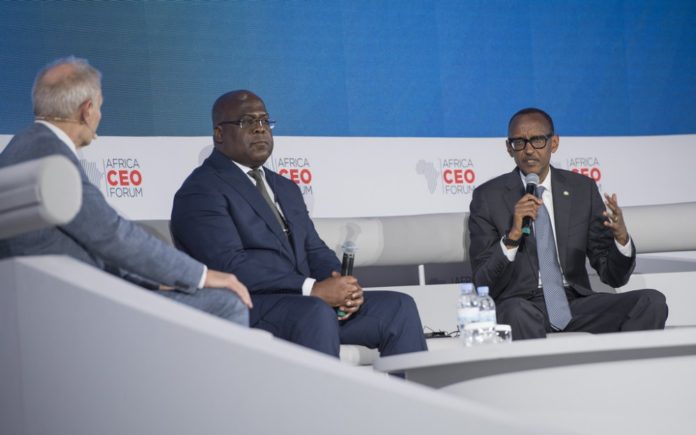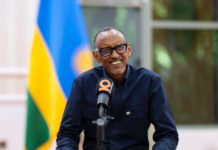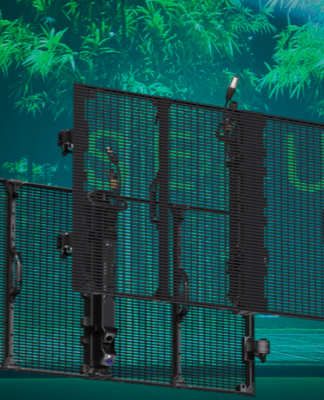By The Rwandan Analyst
Trust is progressively crumbling between DRC and Rwanda so that the president Tshisekedi Felix recently opted for the Ugandan armed forces and Kenyan forces to help him to fight the various rebellions having elected military rear base in eastern regions of this vast country already being aware that Rwanda is renowned in the military cooperation whereby its forces are deployed in Sudan; South Sudan; Central African Republic and even recently Mozambique. Why is the DRC overtly ignoring Rwanda? Is it discrediting its military strike force? The lines below intend to assess the real reasons of such a reversal of diplomatic game.
Facts
The Ugandan and Congo armies are setting up an operations centre in the east of Democratic Republic of Congo for a joint offensive against Islamist rebels who have killed hundreds of people in the last year, Congo’s government said.
On Sunday a delegation from the Ugandan Peoples Defence Force (UPDF) including the commander of Uganda’s ground forces arrived in Beni in Congo’s North Kivu province to establish a coordination centre for the two armies, Kinshasa’s communications ministry said on Wednesday.
A Congo army spokesman was not immediately available for comment. A Ugandan army spokesman said he could not confirm the information given by Congo’s government. On May 3 Congo introduced martial law in North Kivu and Ituri provinces in the hope of addressing worsening bloodshed in a swathe of territory along its border with Uganda. The countries were enemies during Congo’s civil wars, which officially ended in 2003. Relations between the two have at times been strained since then.
A militia with roots in Uganda, the Allied Democratic Forces (ADF), is believed to be responsible for much of the recent violence, killing around 850 people last year, according to U.N. figures. “The (Congolese army) and the UPDF are determined to fight the ADF,” Congo’s ministry of information said in a statement, without giving further details. The ADF has carried out a spate of reprisal attacks on civilians since Congo’s army began operations against it in late 2019. In March the United States labelled the group a foreign terrorist organisation because of alleged links to the Islamic State group, although the United Nations has consistently played down the strength and nature of IS influence in Congo. In April, Congo said it was seeking over $4 billion in reparations from Uganda for its role in the conflicts between 1998-2003 that included supporting rebel groups.
Moreover, Kenya will deploy troops in the eastern region of the Democratic Republic of Congo, one of the most dangerous places in the world. Kenya Defence Forces soldiers will serve under the United Nations Organisation Stabilisation Mission in the DRC (Monusco). They will be part of a rapid intervention force against groups of murderous militias in the region. President Kenyatta’s visit to Kinshasa also earned him a number of crucial trade, defence and security agreements. The two presidents saw this as an opportunity to respond to critics who have accused the governments in the region of doing little to end rebel presence in the east of the DRC.The two presidents agreed to cooperate on security and defence matters through regional blocs.”The two leaders affirmed the need for concerted efforts, at bilateral and regional levels including the EAC, ICGLR, SADC, IGAD and other regional mechanisms, to effectively combat terrorism in all its manifestations and implement strategies to combat radicalisation and violent extremism,” the dispatch said on Thursday.SADC said last December it will accept the proposal by the UN to “realign the current force intervention brigade (FIB) to create headroom for a quick action forces (QRFS) and generate two QRFs from SADC troop contributing countries”.
As Kenya is not a SADC member, it means Nairobi will try pushing further changes to the structure through the UN Security Council, to which it is a member.”
“The UN should support President Tshisekedi’s regional diplomacy, with an emphasis on political reconciliation and economic integration among the DRC’s neighbours as steps to increase security,” said a bulletin from the International Crisis Group, warning the rebels need to be analysed to determine how to deal with them.
Kenya will deploy troops in the eastern region of the Democratic Republic of Congo, one of the most dangerous places in the world.
Kenya Defence Forces soldiers will serve under the United Nations Organisation Stabilisation Mission in the DRC (Monusco). They will be part of a rapid intervention force against groups of murderous militias in the region.
“Kenya will voluntarily be part of the Rapid Intervention Brigade to come and support the FARDC (Congolese army) in order to eradicate insecurity in the east of our country,” President Kenyatta and DRC’s Felix Tshisekedi announced at a joint press conference in Kinshasa last week.
For nearly three decades, eastern Congo has been characterised by insecurity that has led to the displacement of millions. Over 120 armed groups are present in the region, according to the Centre on International Cooperation.
In February, the Italian ambassador to DRC, his bodyguard and their driver were gunned down in the region. President Tshisekedi said Kenya had “volunteered” to support Congolese forces to “eradicate insecurity in eastern DRC”. Kenyan troops also serve under the African Union Mission to Somalia (Amisom) and the United Nations Mission in South Sudan (UNMISS).In 2016, Kenya suffered its worst attack on its troops in a peacekeeping and enforcement mission after Al-Shabaab militants breached barriers at their camp in El Adde and killed almost a company, which is made up between 80-250 soldiers.In the same year, Kenya withdrew troops from South Sudan in response to the sacking of the UNMISS commander, Lieutenant General Johnson Ondieki. In the past, Kenya supported UN missions in the Central African Republic, Sudan, Namibia, Sierra Leone, Chad, Rwanda and DRC.
Analysis
The choice of Uganda forces and Kenya brigades instead of Rwandan defence forces push any wise analyst to think doubly on the real motives of such a geostrategic reversal.
A dark past not inspiring trust
Rwanda is the real challenge in the region because pretending its intervention to chase FDLR it really aims to get minerals of the regions it conquered to the extent that it became an exporter of coltan, diamond, cobalt, gold while the soil of this country does not contain such precious minerals. Besides, the same country had often supported different rebellions that destabilized the DRC; the AFDL of the late Laurent Désiré Kabila whereby general Kabarebe James will be appointed the chief of army staff disguising as James Kabare to “congolize” his name; the RCD-Goma and CNDP headed by general Laurent Nkunda a RPA soldier designated to conduct operations in that region due to his Congolese origins; and M23 of general Makenga Sultan. Worse, in the second Congolese war of 1998, Rwanda personally invaded the DRC and occupied the eastern regions accusing the leaders of the DRC to support FDLR.
An informal presence of Rwandan armed forces
When asked about the supposed presence of Rwandan soldiers alongside Congolese armed forces in eastern DRC, Paul Kagame assured that no RDF forces are deployed in the region rife with numerous armed groups hostile to Kigali.The Rwandan president’s response to this and other questions during a press videoconference organised on 27 April 2021, was highly anticipated. When asked about the increasingly frequentallegations regarding the participation of Rwandan soldiers in operations conducted by the Armed Forces of the Democratic Republic of the Congo (FARDC) in eastern DRC, Paul Kagame unsurprisingly firmly denied them.
“The DRC government knows that there isn’t a single Rwandan soldier in eastern DRC. You can believe me when I say that there aren’t any Rwanda Defence Force (RDF) soldiers in that part of the world,” he said, referring to the situation in South Kivu.
In recent days, it’s mostly civilians in North Kivuand certain elected officials, including Juvénal Munubo, the member of parliament representing Walikale (North Kivu), who have reported the presence of RDF soldiers in this eastern province of the DRC rife with many armed groups hostile to Kigali, including rebels belonging to the Democratic Forces for the Liberation of Rwanda (FDLR). They have also called on the Expanded Joint Verification Mechanism (EJVM) put in place by the International Conference on the Great Lakes Region (ICGLR) to weigh in on the issue.
The recent outrageous declarations of Kagame denying the crimes against humanity committed in eastern DRC where about 6 million of lives were taken away exacerbated the distrust from this country and worsened the previous friendly relationships between the two countries. Time will tell.






























































